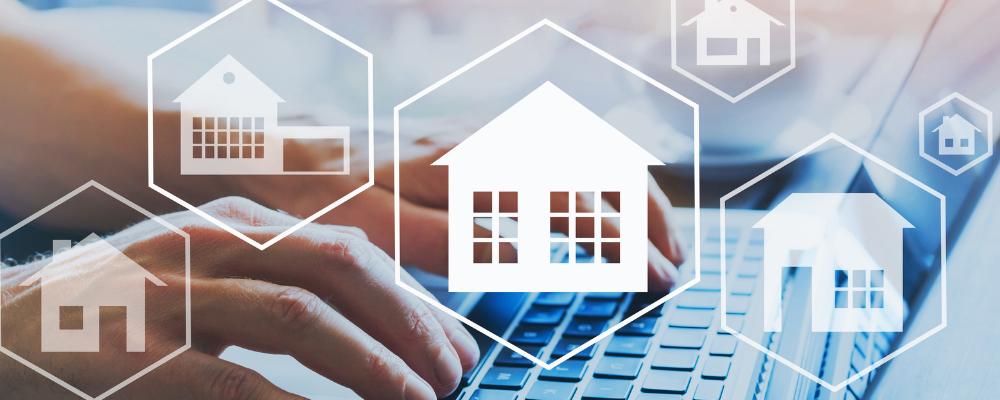The Short Answer
It’s no secret that the blockchain is revolutionizing many industries and real estate is certainly one of these. From increasing the speed of transactions, to improving the transparency and automation of processes, blockchain is quite simply maverick technology that is changing the real estate market.
Blockchain technology uses smart contracts and tokenization to streamline real estate processes and create a significant advantage for those in the real estate industry. Blockchain technology is improving the real estate industry by:
- Creating more transparency
- Reducing fraud
- Making processes more efficient
- Facilitating international real estate investments
- Creating fractional ownership
Skip To
Is Blockchain Technology Being Used In The Real Estate Industry?
‘Blockchain’ has gone from being a buzzword, to transformative technology that is having a multi-faceted impact on the real estate industry. While blockchain technology was originally built for the crypto market, its uses have gone far beyond that.
Real estate is one of the many industries that can benefit from blockchain technology, which is gaining momentum in the real estate industry and transforming the way the industry operates. Some companies have already adopted blockchain technology in order to improve their operations.
Blockchain is the future of real estate, bringing transparency and security to transactions.
Here are the important ways that blockchain technology is being used in real estate:
Smart Contracts
Smart contracts are automated contracts that execute themselves based on pre-determined terms that are coded at the outset. Smart contracts create a level of automation and efficiency that makes transactions smoother and quicker. In real estate, this could mean the automatic transfer of property ownership and funds once all requirements, such as inspections and payments, are fulfilled.
Tokenization
This is the process of turning real-world assets into digital tokens on the blockchain. In a nutshell, tokenization involves creating digital tokens that represent property ownership of an asset. In real estate, this means that properties can be converted into smaller units that are bought and sold.
Tokenization is revolutionizing real estate by making real estate a more liquid asset and providing the opportunity to own small pieces of real estate. Tokenization and smart contracts work hand in hand to be successful blockchain partners for real estate. In fact, in 2021 billions of dollars were tokenized on the blockchain using smart contracts.

What Are Pros and Cons of Using Blockchain For Real Estate?
Benefits of Blockchain For Real Estate
Transparency
Blockchain provides an immutable ledger that offers a higher level of security because all data is recorded and readily available to anyone who wishes to access it. Each transaction is recorded and can be verified by all relevant parties, and this information, along with any other data on the property, history of the building and so on, is available to view. This creates a level of transparency across real estate transactions that is unparalleled.
Reduced Fraud
The increased level of transparency also makes real estate transactions more secure, as information cannot be edited with the consent of both parties. Along with this, all data is easily accessible. Blockchain technology makes property fraud exceptionally challenging, which means that real estate transactions have a higher level of security.
Efficiency
Blockchain technology allows for automated processes using smart contracts, which can speed up transactions significantly. Real estate transactions often involve a lot of paperwork, which adds to the time each transaction takes and results in deals taking longer to close. The digital nature of blockchain technology allows for automation that can speed up real estate deals and allow for far greater efficiency.
International Investment
Geographical barriers are being broken, thanks to blockchain technology. This allows for easier international real estate investments. Global real estate investment was historically a challenging endeavor, but blockchain technology has dismantled this and provided investors with a way to buy and sell property internationally using digital tokens. This allows for portfolio diversification, spreading risk and creates a 24/7 real estate market for investors.
Fractional Ownership
Being able to own portions of a property is a groundbreaking concept for real estate. Tokenization allows for fractional ownership in real estate, which opens the door for investors to invest in high-value properties and diversify their portfolios. Fractional ownership also provides an opportunity for investors to branch out into different property types or begin their investing journey.

Disadvantages of Blockchain For Real Estate
Education and Adoption
Many real estate professionals, real estate agents and investors may not fully understand blockchain technology. So, many people may need to get educated about blockchain to discover its benefits and how it works. This can slow down adoption and use of blockchain technology in real estate as real estate agents and other professionals get to grips with the benefits of this new technology.
Integration Challenges
Blockchain technology can be time-consuming and complex to integrate with existing real estate systems. Many real estate companies use legacy systems and manual processes, which can make the integration of blockchain technology more difficult, and even costly.
Also, blockchain technology has not been adopted widely across the real estate industry yet, which means that not all parties may have the technology and are therefore not on the same page.
Security Concerns
While blockchain technology is generally more secure than traditional systems, no system is entirely safe from hacking. The security of blockchain networks needs to be established at the outset, to ensure that they are as safe as possible when transactions begin.
Regulatory Challenges
The legal and regulatory framework for blockchain in real estate is still being established and is therefore evolving with time. This can create uncertainty and hurdles in some jurisdictions, which will need to be overcome in order to continue. These can be complicated and take time, so this can slow down the process.
Setup Costs and Infrastructure
Setting up blockchain technology in real estate requires an initial investment for the technology and the infrastructure. This is an issue for some organizations, as the cost may be prohibitive. Then there’s also the issue of making sure that the technology is set up correctly and working effectively, which can be time-consuming.

How Blockchain Is Being Used In Real Estate
Use Case 1: Blockchain For Financing Real Estate Transactions
Raising financing for real estate projects can be challenging due to slow loan closing and the large amount of paperwork that is associated with real estate loans. Blockchain technology offers real estate investors the opportunity to get fast, secure funding for real estate transactions thanks to smart contracts and tokenization. Along with providing more efficient financing, these solutions also unlock wider access for investors and give them an alternative to traditional funding options.
For example: The sale of tokens that represent shares in a commercial building, in order to fund its acquisition.
Use Case 2: Blockchain For Asset Management
Blockchain technology can be used to create an efficient way to track and manage a wide range of assets. Real estate assets can be recorded on the blockchain in a transparent manner, where they are tamper-proof. Blockchain technology also allows for real-time asset tracking, which means that the entire journey of an asset can be monitored. Real estate assets can also be tokenized on the blockchain which means that they can be bought and sold.
For example: RealT is a real estate company that uses blockchain for asset management through tokenization. They tokenize real estate properties, allowing multiple investors to own fractional shares of rental properties. The blockchain ensures transparency in property ownership, rental income distribution, and property management. Investors can easily track their ownership and rental income in real-time.
Use Case 3: Blockchain For Loan and Mortgage Securitization
Loan and mortgage securitization can be done more efficiently and securely, using blockchain technology. All parties involved can access the loan information which is freely available on the blockchain, and see the securitization process which is updated in real-time. Mortgage and loan-related documents can be stored securely on the blockchain, reducing the risk of data breaches and unauthorized access. Smart contracts are used to automate data sharing, compliance checks and other tasks, and the relevant parties are then informed.
For example: New Silver securitizes their loans on the blockchain, which means that investors can participate in their DeFi Fund easier. The blockchain technology that is used speeds up the loan process, which allows New Silver to close loans in just 5 days, and provide loan approval in just 5 minutes.

Use Case 4: Blockchain For Property Management
Property management can be done more effectively by using blockchain technology to facilitate data sharing, streamline rental collections and provide fast due diligence. Everything from property ownership information, to tenant verification data and property maintenance can be stored on the blockchain in a secure and easily visible way.
For example: SmartRental Management is a property management company that handles a portfolio of rental properties. They are one of the most forward-thinking blockchain real estate companies using blockchain technology to create smart lease agreements. Through smart contracts they can automatically execute key terms, such as rent payments, lease renewals, and security deposit refunds when specific conditions are met.
Use Case 5: Blockchain For Land and Property Registries
Land and property registries rely on outdated paper documentation and lengthy legal procedures. Blockchain has changed the game in this regard, by providing a method that doesn’t require paperwork and lengthy processes, but instead allows for a secure, shared source where documents can be exchanged and stored between multiple parties. Property records can be verified in an instant, and digital titles and deeds can be used instead.
For example: Cook County, Illinois, has been exploring the use of blockchain technology to improve property conveyance and streamline the transfer of real estate titles.
Use Case 6: Blockchain For Construction and Property Development
Construction and property development companies typically oversee many projects, and this can become difficult to manage with multiple sub-contractors and supply chain processes. Financial management can be done more efficiently using smart contracts to automate agreements. Blockchain technology can simplify procurement processes with reputation management and make all processes digital to streamline the management of projects.
For example: Blok Bioscience is one of the blockchain real estate companies that has been using blockchain technology to track the origin of construction materials, monitor project milestones, and ensure regulatory compliance.

How Will Blockchain Technology Influence The Future Of Real Estate Investing?
It’s safe to say that blockchain is not just a trend, it’s here to stay and reshape the way real estate deals are done. The future of real estate investing looks very interesting, as blockchain technology automates processes, provides higher levels of security and transparency, and profoundly impacts the real estate sector.
The future of real estate investing is being revolutionized by blockchain technology in various ways:
- Accessibility: Real estate investing will be more accessible thanks to tokenization, which enables fractional ownership. This means that investors can buy and sell fractions of properties, so investors who cannot afford to purchase an entire property can begin their journey this way. Alternatively, investors can diversify by purchasing fractions of property types that they wouldn’t have been able to invest in otherwise.
- Administration: Smart contracts allow for less administrative hassles and paperwork. This will make the investment process more straightforward and streamlined.
- Liquidity: Tokenization allows for portions of properties to be traded on secondary markets, which further adds to the liquidity of real estate. This means that these tokens can be traded any day, anytime, and this allows for liquidity in the real estate market.
- Costs: Blockchain technology will reduce the costs of real investing by eliminating intermediaries and streamlining processes. This makes real estate investing a more cost-effective option and can help new investors who don’t have a large budget.
In essence, the future of real estate investing is likely to be more inclusive, liquid, and secure, offering a wider range of opportunities for investors. It’s an exciting time for innovation in the real estate industry, with blockchain technology playing a central role in shaping the future of the real estate sector.



